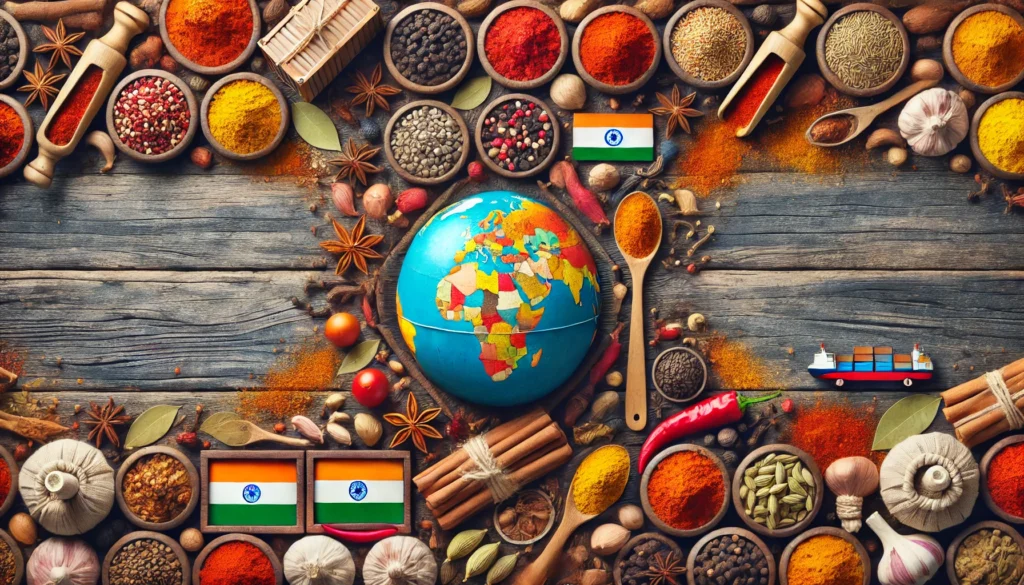India’s Spice Export: A Fragrant Powerhouse

India boasts a rich heritage as a leading producer and exporter of spices. From the fiery heat of red chilies to the warm embrace of turmeric, Indian spices tantalize taste buds and add depth to cuisines worldwide. Here’s a basic overview of India’s spice exports:
India is a major player in the global spice trade, exporting a vast array of spices. Some of the top spices exporting from india
- Red Chilli: The undisputed champion, red chilli adds fire to Indian cuisine and far beyond. Major export destinations include the USA, UAE, and Europe.
- Cumin: Following closely behind is cumin, valued for its earthy aroma and therapeutic properties. It’s a staple in Indian, Middle Eastern, and Mexican dishes.
- Coriander: This versatile spice finds uses in various forms – seeds, powder, and leaves. It graces cuisines across the globe.
- Turmeric: The golden wonder of India, turmeric adds warmth, color, and boasts anti-inflammatory properties, making it a favorite for health-conscious consumers.
- Fennel: More than just an after-dinner treat, fennel seeds lend a licorice-like touch to curries, pickles, and even sausages. They also aid digestion and freshen breath.
- Fenugreek: A common ingredient in Indian and Middle Eastern fare, fenugreek finds uses in food and medicine.
- Cardamom: Hailing from Kerala, Karnataka, Tamil Nadu, and West Bengal, cardamom’s popularity is on the rise due to its versatility in sweet and savory dishes, beverages, and perfumes.
- Mustard: Tiny but mighty, mustard seeds come in various colors, offering a range of heat levels. Used whole or ground, they add punch to curries, pickles, and chutneys. Additionally, mustard seeds are pressed to create everyone’s favorite condiment – mustard oil.
- Ginger: A household name in Indian and Chinese cuisine, ginger finds uses in food, cosmetics, and pharmaceuticals. Its versatility adds a touch of heat to countless dishes.
- Black Pepper: India reigns supreme as a major black pepper exporter, with its peppercorns finding favor in medicinal and dietary products across the US, Germany, and Europe.
Click here for List of Major Basmati Rice varieties exporting from India
Click here for List of Major Non-Basmati Rice varieties exporting from India
Benefits of Indian Spices:
- Rich Aroma & Flavor: Indian spices offer a unique and diverse flavor profile, enhancing culinary creations.
- Health Properties: Many Indian spices boast medicinal properties, attracting health-conscious consumers.
- Long Shelf Life: Most Indian spices offer a long shelf life, making them reliable export options.
Spice Up Your Compliance: Avoiding Export Headaches
To ensure a smooth export process, it’s crucial to comply with regulations set by the importing country. Here’s an important step:
- Pesticide Residue Testing: Different countries have varying limits for pesticide residues on imported spices. Prior to exporting, it’s mandatory for many countries to have the spices tested in a lab to ensure they meet these specific import quality standards.
Proactive Approach: To avoid delays and ensure a smooth release from the port of origin, it’s highly recommended to:
- Research Import Regulations: Stay updated on the latest pesticide residue limits and other import regulations of the target country.
- Pre-Shipment Testing: Sending samples of the spices beforehand for testing in a qualified lab can help identify potential issues and avoid complications during the main shipment.
By following these steps, Indian spice exporters can guarantee their products meet international quality standards, facilitating a smooth export process and maintaining India’s reputation as a reliable supplier of the world’s finest spices.
Spice Board Certificate is Must for Export of Spices from india
The Spices Board of India plays a crucial role in regulating and promoting the export of spices. Obtaining a Spice Board certificate, specifically the Certificate of Registration as Exporter of Spices (CRES), is mandatory for businesses in India looking to export various spices and spice products.
Why a Spice Board Certificate Matters
A Spice Board certificate signifies your company’s legitimacy and commitment to quality standards, enhancing trust with foreign buyers. This pre-qualification opens doors to new markets, as many countries require it for importing Indian spices. Additionally, the application process involves demonstrating quality control measures, contributing to maintaining India’s reputation for high-quality spices. While a Spice Board certificate is essential, an Import Export Code (IEC) issued by the DGFT (Director General of Foreign Trade) is also necessary for exporting any goods from India. The Spice Board certificate has a validity period of three years and needs renewal at the end of each block period.
Online Registration:
- Visit the official website of the Spices Board of India: https://www.indianspices.com/
- Look for a section on “Registration” or “Online Services.”
- Register by providing your personal details and business information. This grants you access to the application system.


